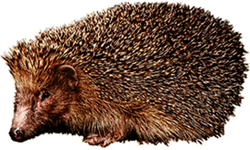...Best of Sicily presents... Best of Sicily Magazine. ... Dedicated to Sicilian art, culture, history, people, places and all things Sicilian. |
by Maria Mazzaro | ||
Magazine Index Best of Sicily Arts & Culture Fashion Food & Wine History & Society About Us Travel Faqs Contact Map of Sicily |
The hedgehogs found in Sicily are very dark, almost black. Otherwise they are not much different from those found elsewhere. They are nocturnal creatures that roll themselves into a ball for protection. In Italy the hedgehog is a protected species. They live in holes in the woods or bush, and it is believed that in Sicily their main threat came from wolves and foxes, both nearly extinct on the island. Vultures, falcons and hawks may still pose a threat here. Sicilian hedgehogs are most often found in the Peloritan, Madonie and Nebrodi mountains, though they also live in other wooded areas. Unless hit by cars or otherwise killed through unnatural means, Sicilian hedgehogs usually live seven or eight years. Like mice and opossums, hedgehogs have a degree of natural immunity to snake venom due to the protein erinacin in their muscular systems. Their diet is based primarily on insects but hedgehogs are actually omnivorous. In Sicily hedgehogs occasionally feed on snails, toads, small snakes, wild mushrooms, grass roots, berries and even watermelons and earthworms. They sometimes make their way into agricultural areas.There is no evidence that Sicily's hedgehogs hibernate. There is no evidence that Sicilians ever consumed hedgehogs as food. Indeed, as long ago as the nineteenth century it appears that few Sicilians even knew of the creature's existence. How many hedgehogs are there in Sicily? Given the animal's habit of coming out only after dark, and the rarity of sightings, it is impossible to know for certain. Its habitat has been restricted in recent decades, though perhaps not much more so than over the last few centuries --extensive deforestation having claimed most of Sicily's woodlands since around 1600. And the porcupine? The essentially-African crested porcupine also lives in Sicily, though it is extremely rare, and shares the hedgehog's habitat. About the Author: Maria Mazzaro writes about nature and environmental topics. | |
Top of Page |
 The humble hedgehog, often confused with
the
The humble hedgehog, often confused with
the